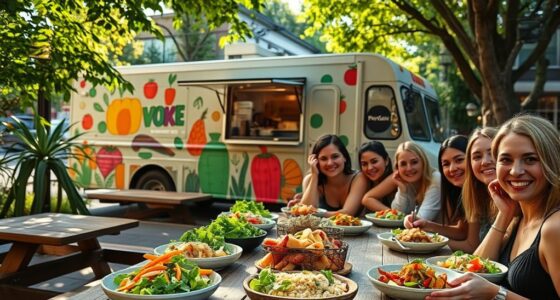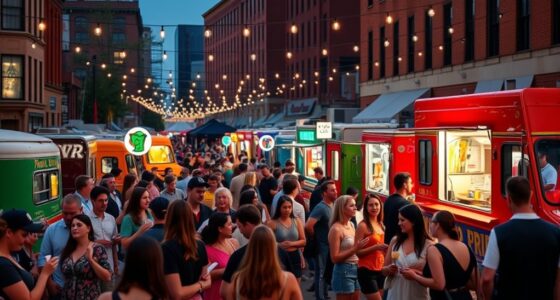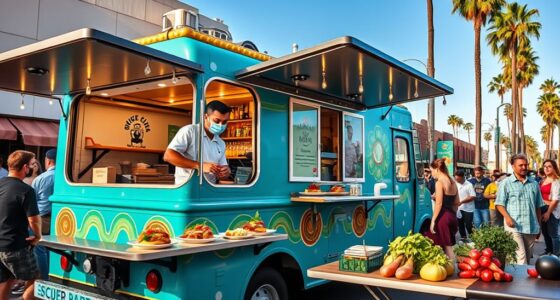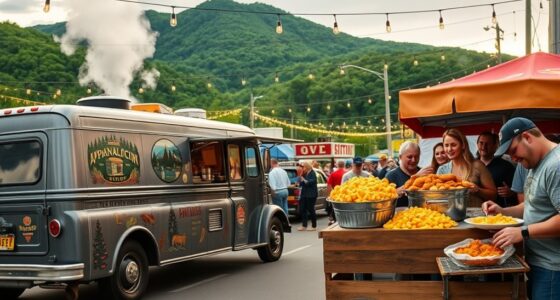In Philadelphia, food trucks serve up iconic cheesesteaks made with thinly sliced beef, melted cheese, and fresh hoagie rolls, offering both classic and creative twists. Amish trucks bring hearty, authentic dishes like meatloaf and baked goods, often family-run and focused on local ingredients. As the scene evolved since 2006, licensing and community events boosted their popularity. Explore how these trucks blend tradition, innovation, and culture—there’s much more to discover behind every flavorful bite.
Key Takeaways
- Philadelphia’s food truck scene features iconic cheesesteaks, with trucks offering various cheese blends, toppings, and bread options.
- Amish food trucks serve hearty, authentic dishes like Amish meatloaf, croquettes, and baked goods using local ingredients.
- Food trucks in Philly are regulated through licenses including health, commercial, and motor vehicle permits, ensuring safety and authenticity.
- Market saturation challenges have led some trucks to diversify menus, participate in events, and incorporate sustainable practices for differentiation.
- Food trucks foster community engagement, showcasing cultural diversity through cheesesteaks and Amish cuisine, while embracing technological innovations.
The Evolution of Philadelphia’s Food Truck Scene
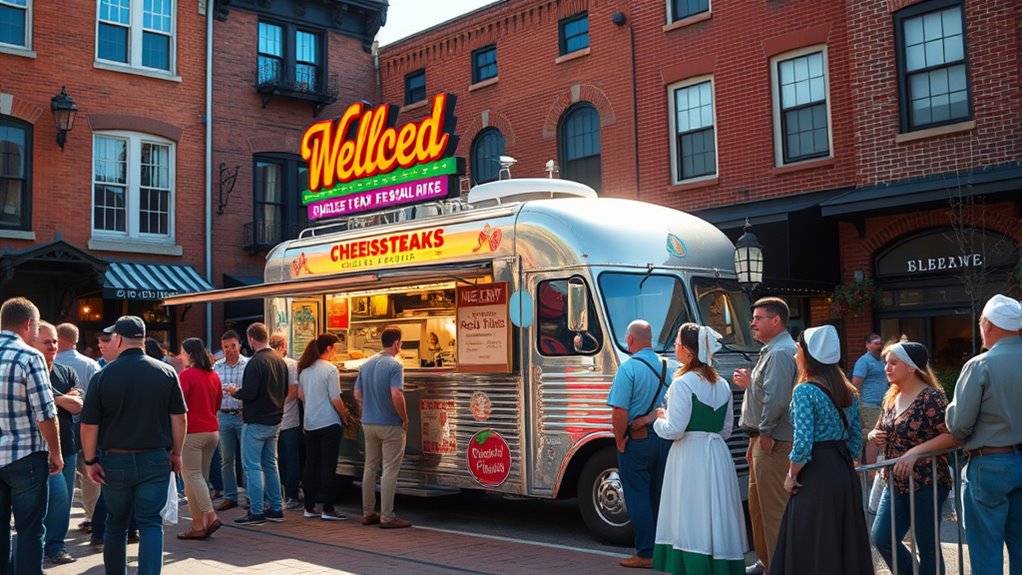
Philadelphia’s food truck scene has evolved considerably over the past decade, shifting from modest beginnings to a vibrant part of the city’s culinary landscape. Early on, mobile food licenses stayed steady between 2006 and 2010, with little growth. Social media marketing only emerged around 2009-2010, later than in cities like Los Angeles and New York. By 2011, the scene gained momentum, attracting media attention by 2012. Early notable trucks included Honest Tom’s, HubBub, Lucky Old Souls, and Guapos Tacos, mostly small operators with simple carts. The scene’s growth was driven by community organization, exemplified by the Philadelphia Mobile Food Association, formed in 2012. This period marked a turning point, as food trucks became more sophisticated and better organized, setting the stage for future expansion. The number of licenses increased by 66% from 2010 to 2015, reflecting a period of rapid growth and heightened interest in mobile food vendors. Additionally, innovations in encryption solutions and cybersecurity practices helped protect vendors’ digital operations during this expansion.
Iconic Cheesesteaks: Tradition and Innovation on Wheels
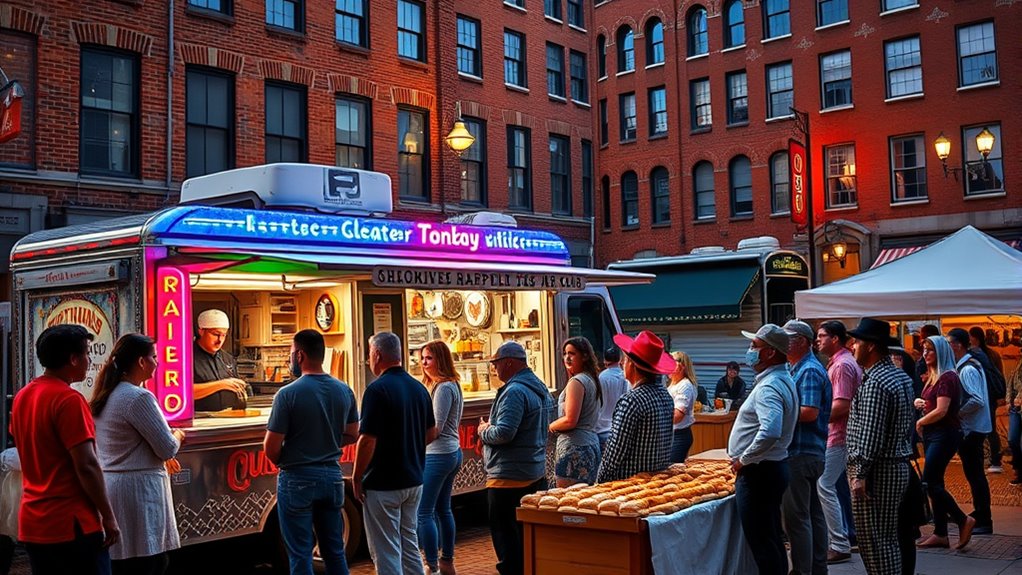
The cheesesteak has become an iconic symbol of Philadelphia’s culinary identity, blending tradition with innovation on wheels. Originating in the city with thinly sliced beef, melted cheese, and toppings in a long hoagie roll, it’s a beloved cultural staple. Pat’s King of Steaks, credited as the creator, sells over 6,000 cheesesteaks each weekend, reflecting its popularity. Food trucks and restaurants across the country import ingredients to replicate the authentic taste, and nationwide, cheesesteaks rank just after PB&J in sandwich consumption. While staying true to its roots, trucks experiment with cheese blends, toppings, and bread types, offering fresh takes and appealing to diverse tastes. These variations help trucks stand out while honoring Philadelphia’s cherished culinary legacy. Revenue management and cost control are essential for food truck owners to maximize profits and sustain their operations. Additionally, understanding support hours can help owners better manage customer inquiries and operational challenges.
Navigating Licensing and Regulations in the City

| License Type | Purpose | Additional Notes |
|---|---|---|
| Food License | Food truck operation | Must pass health inspection |
| BIRT | Tax identification | For business income reporting |
| Com. License | City vending | To operate in designated districts |
| Motor Vehicle | Street operation | Required for on-street vending |
| Food Safety Cert | Hygiene standards | Must be displayed on truck |
The Rise of Black-Owned and Entrepreneurial Food Trucks
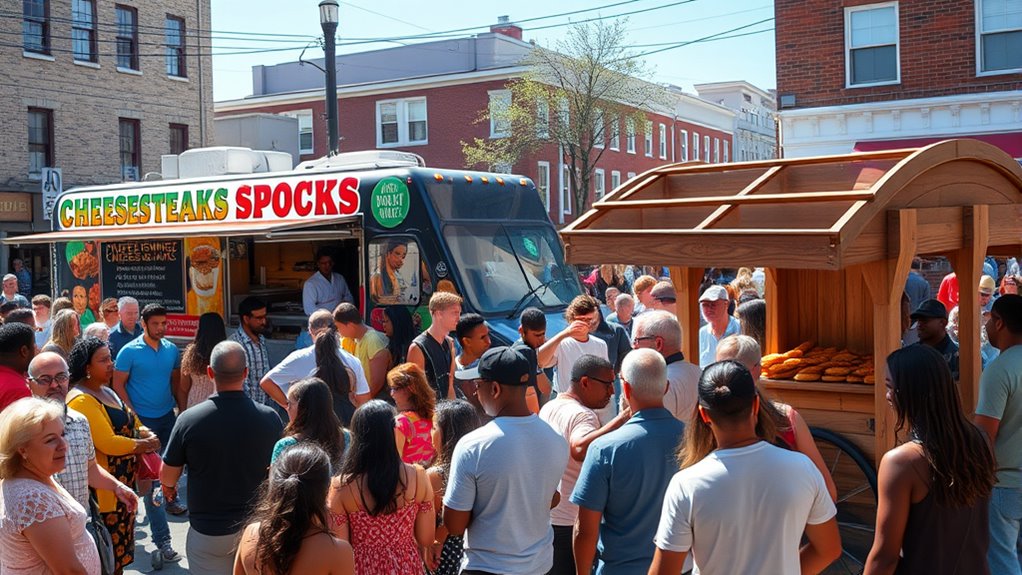
Black-owned food trucks are transforming Philadelphia’s culinary scene by offering entrepreneurial opportunities that are more accessible than traditional brick-and-mortar restaurants. With lower startup costs and fewer licensing hurdles, they make it easier for Black entrepreneurs to enter the industry. Successful trucks like Bake’n Bacon and Cloud Cups have grown into brick-and-mortar spots, showing a clear path to expansion. These trucks diversify revenue through catering and on-the-go sales, helping owners build sustainable businesses. Philadelphia boasts over 100 Black-owned food trucks serving diverse cuisines, from Jamaican to vegan to classic American fare. Partnerships with delivery platforms like Black & Mobile expand reach, while apps and social media make it easier for customers to discover and support these businesses. Additionally, the rise of Pimple Patches has highlighted how targeted skincare solutions can be integrated into busy entrepreneurial lifestyles, reflecting a broader trend of innovation in health and wellness. Overall, food trucks empower Black entrepreneurs and enrich the city’s vibrant food landscape.
Amish Culinary Traditions Making a Mobile Mark
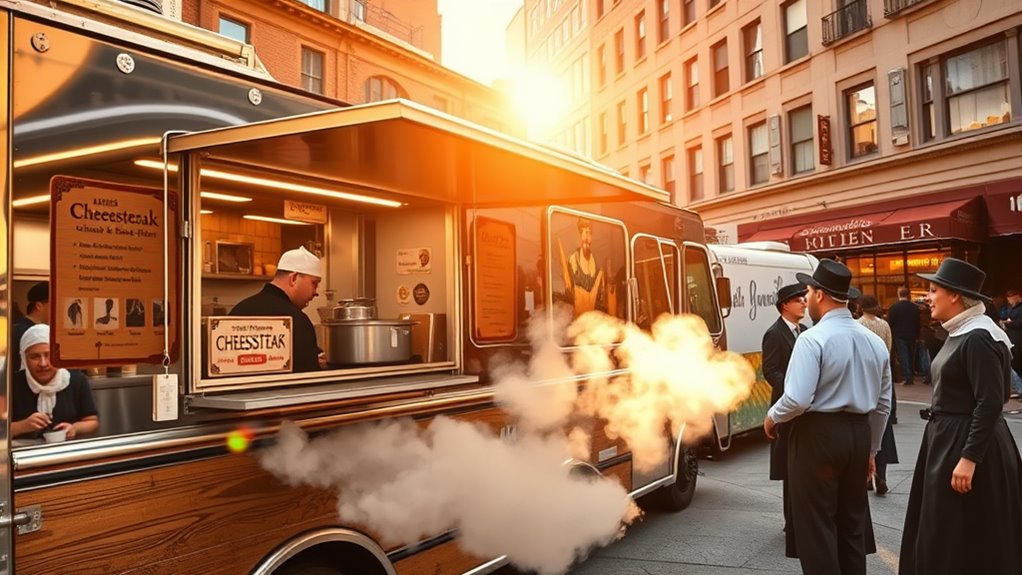
Amish food trucks bring traditional dishes like hearty meats and farm-fresh baked goods to city streets, offering a taste of Pennsylvania Dutch cuisine on the go. They emphasize using local ingredients, ensuring each meal stays true to Amish culinary roots. These mobile vendors help preserve and share Amish traditions with a wider, urban audience. Many of these trucks are family-owned and operated, maintaining the authenticity and craftsmanship of Amish cooking. To ensure sustainable operations, some incorporate payment technologies that streamline transactions and reduce cash handling.
Traditional Amish Dishes
Have you ever wondered how traditional Amish cuisine is making its way onto the bustling streets of food trucks? These mobile kitchens bring hearty, homestyle dishes like Amish meatloaf made with oats and tomato juice, and crispy homemade Shake and Bake chicken, right to your neighborhood. You might also find savory chicken croquettes, formed from leftover chicken and breaded for crunch. Amish casseroles like Yumasetti—creamy noodles with ground beef—or ham and cheese noodle dishes serve as filling, one-dish meals. Soups like chicken noodle with dumplings or thick chowders highlight Amish comfort food. For special occasions, food trucks might offer Fasnachts, Amish doughnuts, or pork and sauerkraut, blending tradition with convenience. These dishes keep Amish culinary traditions alive on the move. Utilizing meal planning apps can help vendors organize their offerings and ensure consistency.
Emphasis on Local Ingredients
Local ingredients play a key role in bringing authentic Amish flavors to Philadelphia’s food trucks. You’ll notice Amish-produced dairy, like cheeses and butter, prized for their purity and freshness, often sourced directly from Amish farms or markets. Meats come from locally raised, hormone-free Amish farms, offering sustainable protein options. Seasonal vegetables and herbs, harvested straight from Amish gardens, add vibrant flavor and freshness. Many trucks also feature Amish baked goods, such as breads and pastries, for authentic texture. Some establish direct relationships with Amish vendors at markets like Dutch Country Amish Market, ensuring ingredient quality and supporting local producers. This emphasis on fresh, natural ingredients preserves Amish culinary traditions while providing you with wholesome, flavorful, and authentic mobile meals. These practices help maintain the integrity of Amish food heritage and support sustainable farming communities. Additionally, the use of transparent sourcing fosters trust between vendors and consumers, ensuring quality standards are met.
Popular and Profitable Items in Philly Food Trucks
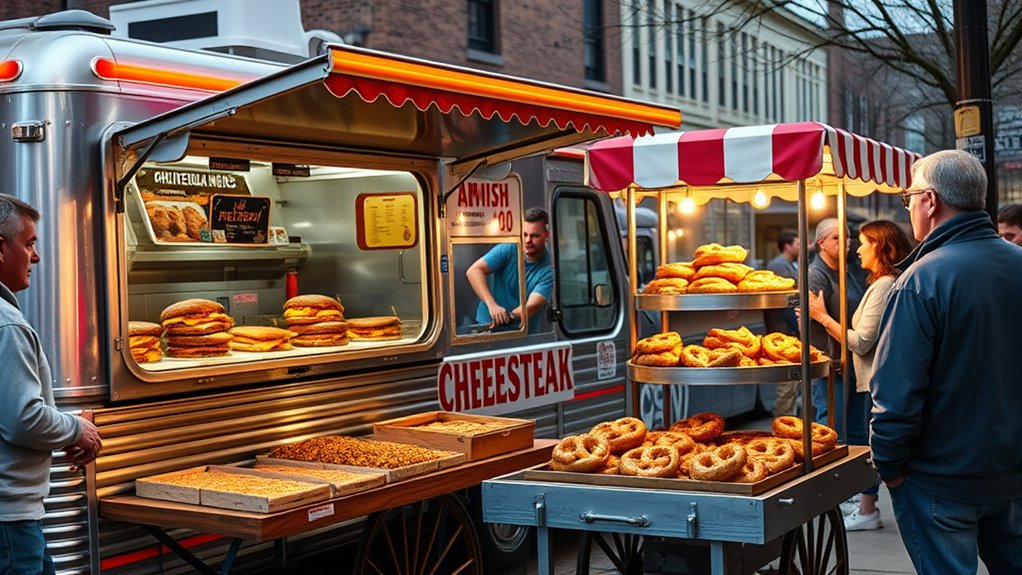
In Philadelphia’s vibrant food truck scene, certain menu items consistently attract crowds and generate high profits. Cheesesteaks top the list, with toasted rolls and iconic fillings like sliced beef, cheese whiz, and creative toppings such as peppers and onions. They’re perfect for quick grab-and-go service, appealing to both locals and tourists craving authentic Philly flavor. Amish-inspired dishes like hearty pretzels, whoopie pies, and scrapple also perform well, offering comfort food with a farm-fresh appeal. The table below highlights popular items:
| Item Type | Key Features |
|---|---|
| Cheesesteaks | Classic and creative toppings, fast prep |
| Amish Pretzels | Soft, flavorful, portable |
| Hamburgers | Customizable, easy to cook |
| Funnel Cakes & Churros | Sweet snacks, high profit margins |
These items keep trucks profitable and in demand across Philadelphia. Hamburgers are also a versatile and universally loved option, often serving as a reliable mainstay on mobile menus because of their ease of customization and widespread appeal. Additionally, incorporating sustainable food practices can enhance customer loyalty and support the long-term success of food trucks in the competitive Philly market.
Challenges and Opportunities in a Saturated Market

As the Philadelphia food truck scene becomes increasingly crowded, you’ll face tough competition and shrinking profit margins. To stand out, you need to innovate and find ways to differentiate your offerings from others in the market. Embracing new ideas and niche concepts can open opportunities despite the saturation. For example, some trucks are focusing on unique themes like cheesesteak or Amish-inspired foods to attract specific customer segments, leveraging local culinary traditions to carve out a distinctive niche. Incorporating sustainable practices into your operations can also appeal to environmentally conscious consumers and set your truck apart in a competitive landscape.
Market Saturation Effects
Market saturation in Philadelphia’s food truck scene presents both significant challenges and unexpected opportunities. With the peak around 2015, the number of trucks has declined due to reduced profitability, safety incidents, and community pushback, like Drexel University discouraging trucks. Many early owners have shifted to brick-and-mortar locations, highlighting saturation’s impact.
| Challenge | Opportunity |
|---|---|
| Thin profit margins | Events like Night Market attract large crowds |
| High operational demands | Catering contracts expand revenue streams |
| Market oversaturation | Increased visibility boosts growth |
| Community resistance | Building relationships fosters loyalty |
Despite hurdles, strategic participation in events and community engagement offers avenues for growth and sustainability amid a crowded market.
Innovation for Differentiation
How can food trucks stand out amid fierce competition? The key is innovation and diversification. Expand your menu beyond classic cheesesteaks by offering unique variations, seasonal specials, and limited-time items that encourage repeat visits. Catering to dietary restrictions like vegetarian, vegan, or gluten-free options can attract niche audiences. Including complementary items such as sides, drinks, and desserts boosts revenue, while sourcing fresh, local ingredients enhances your brand story. Developing a strong brand identity through consistent visuals and storytelling fosters recognition and emotional connections. Partnering with local influencers and maintaining an active social media presence increases visibility. By staying agile with customer feedback, leveraging digital marketing, and streamlining operations, you can differentiate your truck and thrive in a crowded market. Incorporating Gold IRA insights into your business strategy can also help ensure long-term financial stability and growth.
Community Engagement and Local Events
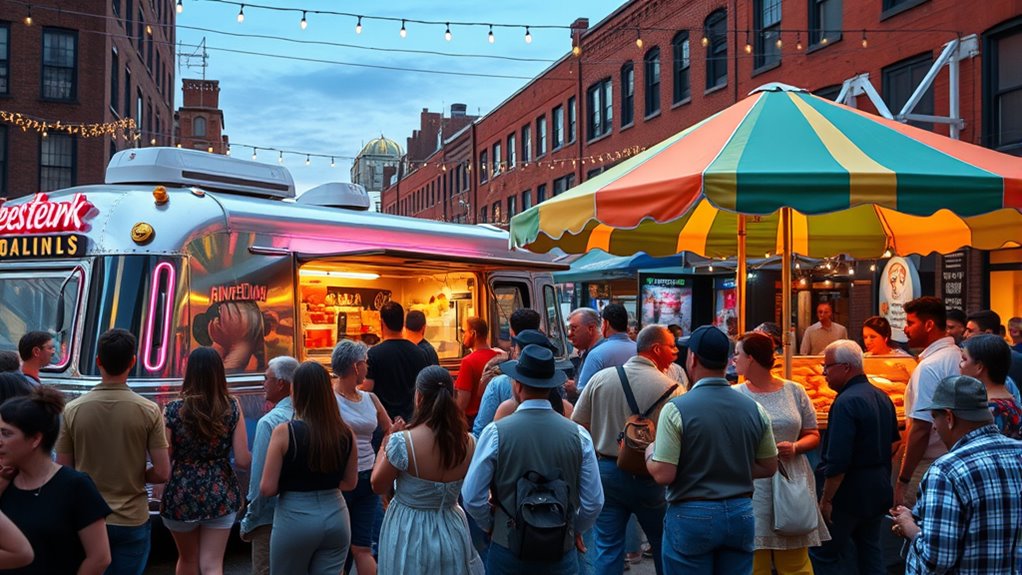
Food trucks in Philadelphia play a pivotal role in fostering community engagement by serving as dynamic spaces where local residents and entrepreneurs connect. You’ll see vendors like Samosa Deb, who started as a corner store and grew into a celebrated food truck, actively participating in events like Night Market, creating a lively social atmosphere. These trucks embrace multicultural communities by offering diverse food options, promoting cultural representation and economic inclusion. They also partner with local organizations, such as the Village of Arts and Humanities, strengthening neighborhood ties. Serving as mobile social hubs, food trucks attract varied community members and encourage public interaction. The variety of food truck offerings enhances the cultural diversity of the city’s culinary scene. By participating in city-sponsored events, they gain visibility, support local culture, and contribute to community cohesion, making Philadelphia’s food scene vibrant and inclusive.
Future Trends Shaping the Food Truck Industry
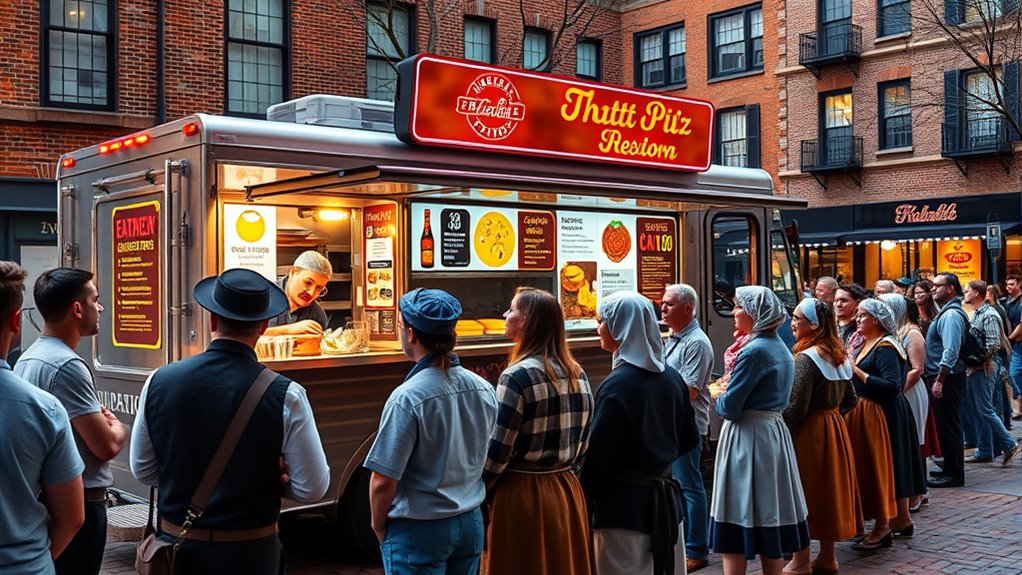
Advancements in technology are transforming the food truck industry by streamlining operations and enhancing customer experience. AI-powered systems, like voice ordering, boost accuracy to 83–88% and cut labor costs by around 20%. Geofencing and mobile app integrations enable precise targeting at events, increasing engagement. Digital receipts support sustainability and speed up transactions. QR code ordering improves on-the-go convenience, especially at mobile events. Additionally, AI-driven upselling tools create premium menu options, increasing revenue per customer. The industry is also embracing eco-friendly practices, with a 25% rise in demand for sustainable packaging and a shift to electric vehicles, reducing fuel costs by 15%. The market is projected to reach a valuation of $1.8 billion in 2024, indicating rapid growth and increased investment in innovative solutions. Hybrid concepts and waste reduction strategies ensure compliance with regulations. These innovations are shaping a more efficient, eco-conscious, and consumer-focused food truck landscape.
Frequently Asked Questions
How Do Food Trucks Maintain Authentic Amish Recipes on the Go?
You maintain authentic Amish recipes on the go by sourcing traditional ingredients locally and using pre-measured kits to guarantee accuracy. You adapt preparation techniques with portable ovens and steamers, and train staff to replicate Amish methods. You also follow strict recipes, monitor quality, and store ingredients properly. This way, you preserve flavor, texture, and authenticity, even in the mobile environment, delighting customers with genuine Amish dishes on the street.
What Are the Most Popular Locations for Cheesesteak Trucks in Philadelphia?
Imagine the city’s heartbeat echoing through bustling streets—that’s where you’ll find the most popular cheesesteak trucks. South Philadelphia’s historic corners, University City’s lively campuses, and Center City’s busy sidewalks serve up the tastiest bites. Fishtown’s trendy vibe and Old City’s tourist trails also draw crowds. You, as a food truck, should aim for these high-traffic zones, especially near stadiums, parks, and markets, to serve hungry crowds at their peak moments.
How Do Food Trucks Ensure Compliance With Philadelphia’s Strict Licensing Laws?
You guarantee compliance with Philadelphia’s strict licensing laws by obtaining all necessary permits before operating, including the Mobile Food Facility Permit, business license, and food handler certifications. You must operate in a licensed commissary, follow health and safety regulations, and pass regular inspections. Keeping your documentation current and accessible, maintaining hygiene standards, and adhering to vehicle and business regulations help you stay compliant and avoid penalties.
What Makes Amish-Inspired Food Trucks Stand Out in Philadelphia’s Market?
You’ll notice Amish-inspired food trucks stand out in Philadelphia’s bustling market because they serve hearty, authentic dishes rooted in tradition, yet delivered on wheels. Their rustic charm and storytelling about Amish heritage draw curious customers seeking genuine flavors. By using regional ingredients and homemade recipes, they create a unique niche amid trendy food trucks. It’s a perfect blend of simplicity and cultural richness that turns heads in a city known for its diverse culinary scene.
How Has Digital Technology Impacted Philly’s Food Truck Customer Engagement?
Digital technology has transformed your customer engagement by making interactions more personalized and convenient. You can now use loyalty apps to reward repeat customers, run targeted local SEO campaigns, and share high-quality visuals on social media to attract attention. Automated CRM messages, online ordering, and geo-targeted ads help you build relationships and drive traffic. This tech-savvy approach boosts loyalty, increases orders, and keeps your food truck top of mind in Philadelphia.
Conclusion
As you explore Philly’s flourishing food truck scene, you witness a vibrant variety of voices, flavors, and innovations. From cheesy classics to Amish-inspired bites, each truck tells a tale of tradition and transformation. Embrace the evolving energy, engage with diverse entrepreneurs, and enjoy the exciting experiences awaiting you on every street. Philly’s food trucks serve as a delicious dance of daring dishes, dynamic developments, and diverse communities — a true demonstration of the city’s culinary creativity.


